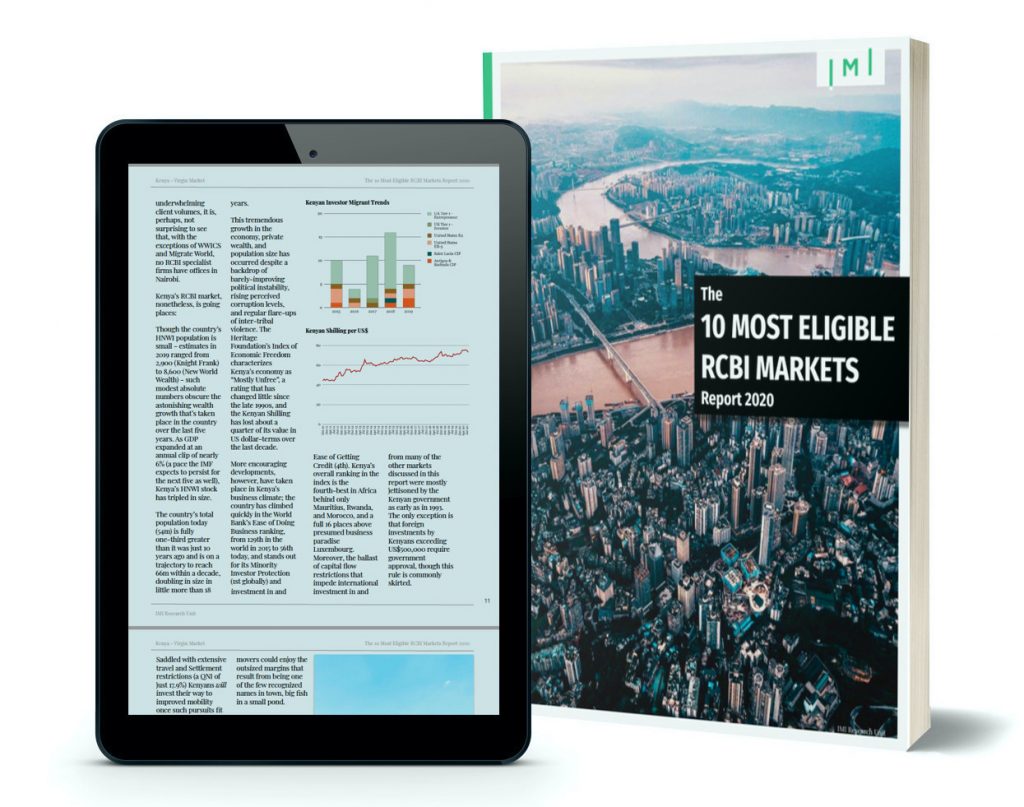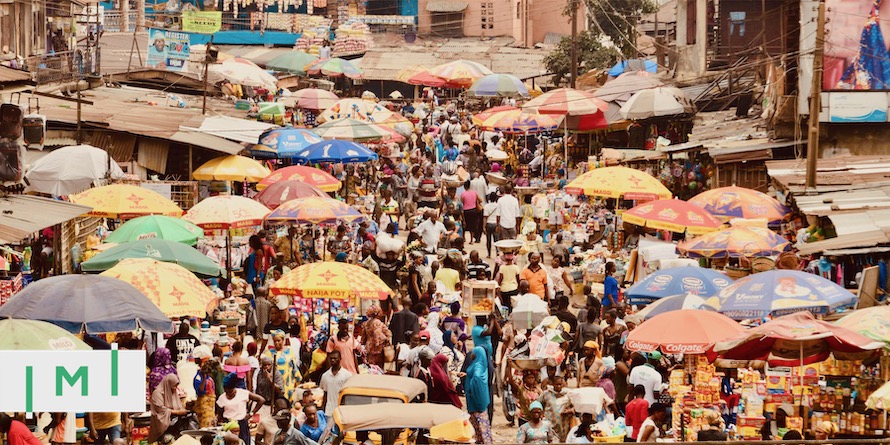3 Reasons You Should Make The Nigerian Investment Migration Market a Priority

Anatoliy’s Analysis
With Anatoliy Lyetayev
Anatoliy Lyetayev covers topics that help industry professionals be more efficient, do more business, and make more money.
Ask an investment migration professional which market is the most attractive for the industry and most will give one of three responses; China, Russia, or the MENA region. This has been the case for so long, the data supports it. There is, however, a rising star, or dark horse if you will, that should not be underestimated when considering the best markets for our outbound investor migrants; Nigeria.
The African country ticks all the boxes for a strong RCBI market yet its potential is vastly overlooked. Today’s article will consider the reasons I would characterize Nigeria as a golden goose for RCBI firms.
#1 – An abundance of potential clients
Although Nigeria’s economy is still nowhere near competing with the likes of the US and UK and has seen a decline in 2020 – much like every other country in the world – as its GDP dropped 4.28%, it remains an African economic powerhouse. Africa’s most populous country has no shortage of well-to-do residents, if data from the Knight Frank Wealth Report are to be trusted:
- In 2019, Nigeria was home to 40,142 high net worth individuals.
- It also had 724 ultra-high net worth individuals (UHNWIs, those with investable assets exceeding US$30m).
- Knight Frank, in its 2020 Wealth report (published after the onset of the pandemic), projected 13% growth in the HNWI population between 2019 and 2024.
The potential clients, consequently, are there, especially considering that the Nigerian passport provides visa-free access to a mere 46 destinations worldwide, none of which are in Europe or North America.
#2 – Nigerians are increasingly aware of the existence of RCBI options
The pandemic has pushed Nigerians to find solutions to their limited mobility, financial insecurity, and to formulate an overall “Plan B” through the tools afforded by investment migration. While only very limited data on Nigerian applications for residency or citizenship around the world is as yet available for 2020, my own firm’s inquiries from Nigerians – if they can serve as a proxy measure – more than doubled from 2019 to 2020. While the market is truly taking off only now, Nigerians have long been aware of the life-altering attributes of RCBI and have been dabbling in it for quite some time.
The following data substantiate that claim:
- 88 Nigerian main applicants saw their applications for Antigua & Barbuda’s CIP approved between 2013 and 2019;
- St. Lucia’s CIP granted 15 Nigerian main applicants and their family members citizenship in the 2019-20 fiscal year, which ended in June, compared to just three in each of the two preceding fiscal years;
- 31 Nigerian families received their green cards through the USA’s EB5 program in 2020;
- Vanuatu reported that, out of six West-African countries, Nigeria accounted for the bulk of the applications each year from 2017 to 2020.
While we wait for more statistics from more programs regarding 2020, the numbers above are a fair indication that the Nigerian market has that initial foundation of RCBI awareness that would make entering the market a calculated gamble.
#3 – Nigerians need RCBI (badly)
The Nigerian elite find themselves in a peculiar position; they are making their investments count within the African nation, but find themselves shackled to its boundaries for a lack of mobility. Enter RCBI.
Astute Nigerian investors find it considerably more difficult to roam the globe making money than, say, German nationals, as the weakness of their passport (ranked 97th globally in terms of travel freedom) necessitates extensive preparation to travel almost anywhere. It does not stop there, however, as rejection rates of Nigerian nationals for visas to popular destinations such as the UK, USA, and EU are astronomical, to say the least, just take a look at this:
- UK visitor visa refusal rates in 2019 for Nigerian nationals was 32.16% (42,772 of 132,996 applications rejected);
- Schengen visa refusal rates for Nigerian nationals in 2018 was 49.75% (44,076 applications rejected out of 88,587);
- USA B1 refusal rates for Nigerian nationals in 2019 was a colossal 67.2%.
Keep in mind that those rejections were dealt Nigerian visa applicants after they had provided documentation that is far more comprehensive than any European or North American applying for visas to anywhere need to provide, such as proof of financial means (typically in the form of bank statements), of accommodation, of travel insurance, as well as, in many cases, employment contracts, income tax returns, and so on. Nigerians need to collate so much documentation, essentially, that if you didn’t know they were applying for a short-term Schengen tourist visa, you’d think they were applying for citizenship. In other words, the rigmarole an American has to go through to obtain citizenship by investment in the Caribbean isn’t all that much more than what a Nigerian faces when he wants to go to Paris.
It’s not just about the travel, however. Nigerian banks face repeated sanctions, international wire transfer obstacles, and a complex financial landscape. This makes financial freedom even more difficult to achieve in the African country. Add to that the weak (and continually weakening) currency – one Nigerian Naira buys you US$0.0026 – and you’ll see why many Nigerians are keen to diversify their asset base, or to simply relocate it to somewhere with a financial structure on more solid footing.
The country, while characterized by natural splendor, grapples with a wide array of social issues that decrease the overall quality of life. To wit:
- Nigeria’s Human Development Index rank (the UN’s indicator of a country’s overall development and living standard) sits at 161st out of 189;
- The World Health Organization (WHO) ranks Nigeria’s health system at 187th out of 191 countries worldwide
- Nigeria’s GDP per capita is US 2,229.86 compared to St. Kitts and Nevis which is US 19,934.97 and Antigua & Barbuda which is US 17,112.82. We still haven’t mentioned the GDPs of countries in Europe or North America.
- Last, but certainly not least, Nigeria ranks 3rd in the world in the Global Terrorism Index, surpassed only by Afghanistan and Iraq, and well ahead of perennially combustible destinations like Syria, Yemen, Somalia, and Pakistan.
These numbers make for grim reading and would be sufficient to deter elites away from any location in the world. Nigerians want, but more importantly, need investment migration, and the data bears that out.

This report is a detail-rich discussion on each of the world’s ten highest-ranked RCBI markets according to the findings of the Investment Migration Market Eligibility Index© (IMMEI).
The IMMEI and this accompanying report were created in response to investment migration executives’ repeated inquiries as to which RCBI markets globally show the most promise and which, consequently, should be the focus of their time, resources, and company expansion plans.
The 10 Most Eligible RCBI Markets
Report 2020
The report contains a wealth of data on each of the ten most eligible markets, and the essential information necessary for investment migration executives to make informed choices as to which markets to target, such as:
- RCBI participation statistics
- The number of approved applications for every major investment migration program from each market, for every year in the period 2015-19. Find out which types of programs (RBI vs. CBI vs. SUV) are the most popular among particular nationalities.
- HNWI population estimates and forecasts
- How many HNWI live in each market now, and by how much is the HNWI population expected to grow over the next five years.
- RCBI company competition analysis
- Which RCBI companies have offices in which markets? How many RCBI companies does each market have? Which RCBI companies are dominant in each market? The report contains a database of more than 100 RCBI-firm offices in the top 10 markets.
- Legal, regulatory, and political
- See which countries impose capital controls, restrictions on dual citizenship, or limits on foreign ownership. Compare the performance of each market’s currency over the last decade.
- Accessibility
- How cheap or expensive would it be to expand into a particular market? How hard is it to find qualified local personnel?Compare markets on cost of living, the price of Grade A office space, talent pools, and salary expectations.
- Long-term market potential
- Compare countries on how fast their economies and populations have grown in the last five years and at what pace they are forecast to grow over the next five.
IMI Club Pro Members:
FREE
IMI Club Members on annual billing plan (50% discount):
€249
IMI Club Members on monthly billing plan (25% discount):
€375
SPECIAL OFFER
1 year of IMI Club Membership +
the Report:
€299 (save 52%)
Non-Members:
€499
I am a former human rights lawyer turned founder of global citizenship and residence advisory company Migronis Citizenship
We can choose where to live and do business. I have been living in different countries, such as the USA, Brazil, Portugal. I test countries and evaluate them according to my criteria. Therefore, I know what to offer my clients.
I appreciate the freedom of movement. That is why I help others get it.



